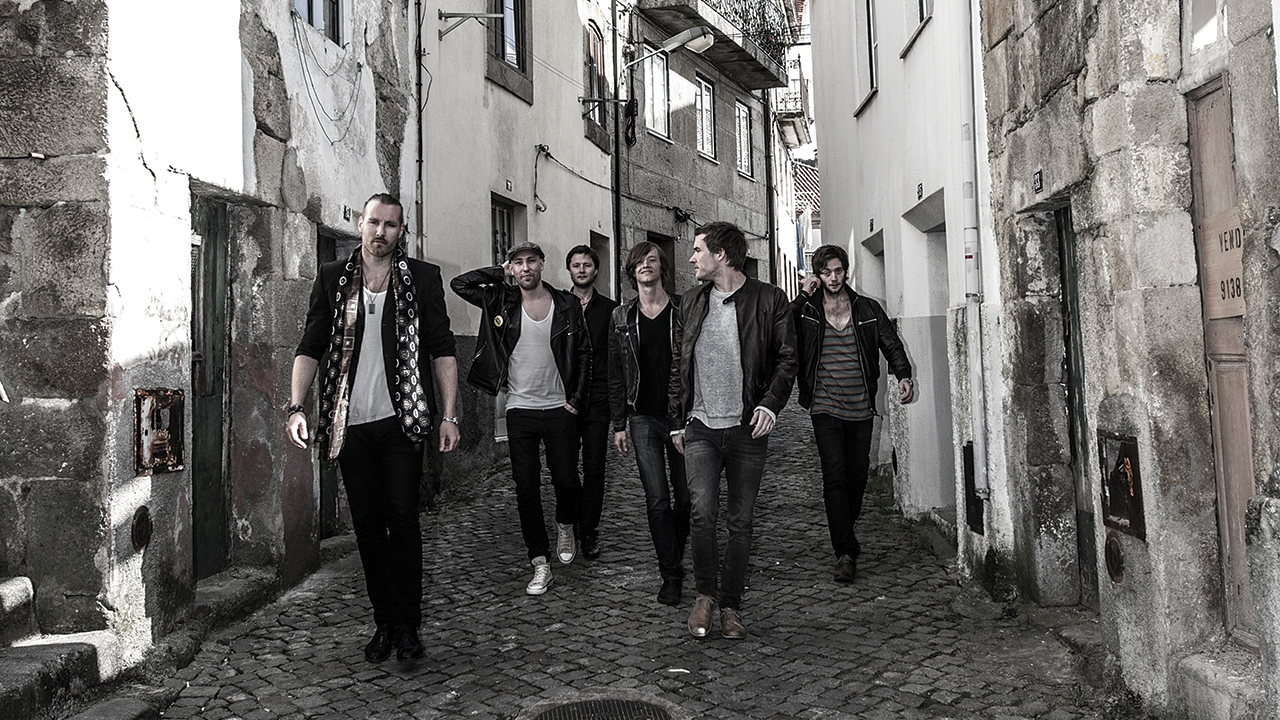Whether through the influence of misty-eyed nostalgia, hunger for the thrill of future promises or simply the sublime indulgence of songs that last for more than 20 minutes, time is all-important in the world of prog. As this magazine has proudly shown, anniversaries are also often worth celebrating, particularly in the context of a genre that has twisted and turned for over four decades.
As a result, the fact that Swedish symphonic prog crew Moon Safari are about to celebrate 10 years of making sweet music together by releasing an album that delves deep into the band’s own real-life pasts, via some of the most wildly adventurous and yet deceptively traditional songs of their career, boasts a somewhat delicious and intriguing symmetry.
Formed in the small town of Skellefteå back in 2003, Moon Safari have made steady progress along the way, accruing a sizeable international fanbase with a series of albums that really should have propelled the band to the upper echelons of modern prog. But now, with their fourth full-length opus, Himlabacken Vol.1, these masters of melodic intricacy must surely be poised to make the impact their exquisitely crafted music has long deserved.
“If you were to have heard us back in 2005 and then again now in 2013, it would become really apparent that we have undergone a huge transformation over the years,” says drummer Tobias Lundgren. “The first couple of years we never played live. We did our first gig in 2005 or 2006 and then [guitarist] Pontus Åkesson’s first gig was in Germany and that was our first gig abroad. From when Pontus joined the band up until the last tour, we only ever played one or two gigs at a time and maybe four gigs a year. On the last tour we played 10 gigs in a row and after that you really come into your own when it comes to the live sound, I think.”
With a six-man line-up featuring Åkesson and his brothers Simon (lead vocals/keys) and Sebastian (keys/vocals), alongside Lundgren, bassist Johan Westerlund and co-lead vocalist Petter Sandström, Moon Safari have both the inter-familial chemistry and the necessary number of skilled limbs to fully realise the profoundly dense and detailed music that has typified their recorded works to date. In fact, as Lundgren argues, the Swedes only really hit their stride after Pontus replaced original guitarist Anthon Johansson (a one-time member of Swedish proggers Black Bonzo and now 70s rock archaeologists Gin Lady) in 2005.

Since that moment, the remarkable sonic alchemy that takes place when the three brothers’ voices combine – ably augmented by their remaining bandmates – into a fizz of choral perfection has become a hallmark of a unique and mesmerising sound that airily merges the very best of languorous symphonic indulgence and breezy, sun-kissed, quasi-Californian power pop.
Although albums like 2008’s gargantuan double set Blomljud brimmed with ideas and moments of instrumental complexity, it’s the band’s harmonies that set them apart from the vast majority of their European and US prog peers. Joyously, those harmonies are present and correct and plastered all over Himlabacken Vol.1, its tales of childhood revelry and bittersweet reminiscence brought vividly to life by four, or sometimes five, interwoven male voices. It’s frequently redolent of the Beach Boys’ imperious late-60s peak and all devised and orchestrated by mercurial frontman Simon Åkesson.
“Pontus, Simon and Sebastian, they’ve done this kind of singing since birth,” explains Lundgren. “Simon is the spider in the web because he’s the guy who arranges all the harmonies. Me, Johan and Petter struggled in the beginning just trying to remember our parts, but if we’re practising a harmony now, I’d say we have two or three tries and then we’ll nail it because we’ve come that far in our skill. We’re not professional musicians – we’re doing this in our spare time – but not even professionals could nail these harmonies, so what more could we ask? We’re nailing them and that’s pretty fucking good!”
“A lot of people think that Simon is inspired by Brian Wilson and the Beach Boys, but his main influence when it comes to arranging vocal harmonies is a guy called Gene Puerling,” adds Pontus. “And he was also Brian Wilson’s biggest influence, so I think that’s why, when people don’t know who Gene Puerling is, the easy reference is the Beach Boys…”
“…but when it comes to arranging, it’s Georg Riedel, who worked with Astrid Lindgren for many years,” Lundgren continues. “He does a lot of Swedish film music but in a folky style. We all love him, so sometimes that shines through in Moon Safari recordings as well.”

Lyrically, too, Moon Safari are plainly not a band to shy away from levels of sweetness that could, in less able hands, be somewhat hard to stomach. Himlabacken Vol.1 is a concept album of sorts: a sincere study of the wide-eyed wonderment of childhood and the importance of never losing sight of that innocence as adulthood and responsibility take hold.
That the Swedes manage to express such simple but potent sentiments via music that brilliantly evokes the freedom, beauty and infectious euphoria of hazy summer days spent in the pursuit of exhilaration and the embracing of boyish camaraderie marks them out as that rare beast: a prog rock band that cherish the simple things in life.
“Himlabacken means Heavenly Hill in Swedish,” explains Lundgren. “That’s where all of the band, except me, grew up, in this village outside our home town of Skellefteå. This hill was where they went to ride their sleds. The whole album is nostalgic. The first three albums were Petter’s creation and were mostly about how he met his ex-girlfriend. They met when we were recording Doorway To Summer, Blomljud was made when they were in the middle of their relationship and then Lover’s End was from when they broke up.
“This album comes more from Simon, I guess, and he has two kids now, so it’s more of a playful album in many ways. We sing in the intro, Kids, that, ‘The kind of man we want to be plays hide and seek back in ’93.’ It’s more of a view of what kind of people we’ve become and where we’re from, and about coming to terms with not being a kid any more.”
While vocal harmonies and a knack for exploring emotionally strident universal themes may be Moon Safari’s biggest weapons, Himlabacken Vol.1 reveals that the band’s collective instrumental abilities seem to have reached an extraordinary new peak in the three years since their last album, Lover’s End.
Still firmly rooted in symphonic prog, songs like the mischievous and schizophrenic Mega Moon, the brooding Barfly and the impossibly elegant and uplifting closer Sugar Band proclaim a gift for uniting instantly memorable melodies with fiendishly inventive arrangements while still retaining sufficient room for all the analogue keyboards and spiralling lead breaks demanded by a certain breed of atavistic prog fan.
Brave and distinctive but gently familiar, the balance struck is one that dares to dream of a compromise between old-school diehards and prog’s new breed.
“A lot of prog purists don’t like that we’re pretty poppy sometimes and we have three-minute songs and they’re more upbeat and catchy than most traditional prog songs,” sighs Lundgren. “They just say that we’re not really prog or we’re ‘prog lite’ or something like that. But if we can appeal to both of those worlds and appeal to people who aren’t into prog at all, that’s better than being stuck in one genre. I don’t think the music becomes worse because of that. Or maybe it does from a prog perspective!”

Having only played live sporadically during their first decade, Moon Safari are embarking on their first major tour of Europe this September, including several dates in the UK. In keeping with their new album’s focus on the glories of childhood, the touring life is plainly something that these dedicated music makers would like to experience on a more routine basis, not least because it provides them with the opportunity to regress back to the carefree mindset that inspired their latest and greatest songs.
Moon Safari are coming out to play. Don’t be a stick in the mud. Join in the fun.
“We always say that when we’re out playing with the band it’s like we’re 15 or 16 again,” says Lundgren. “We get to hang out with our friends and play music. When you’re at a gig, you have people caring for you. They say, ‘Sleep here, eat this, here’s some alcohol for you…’ We get to be irresponsible, basically, and the biggest part of childhood is that you don’t have to be responsible for anything.
“Our dream is to do this full-time, so maybe one day we can live that way all over again. Maybe that’s the way that we can keep the childhood spirit alive.”
This article originally appeared in issue 38 of Prog Magazine.

